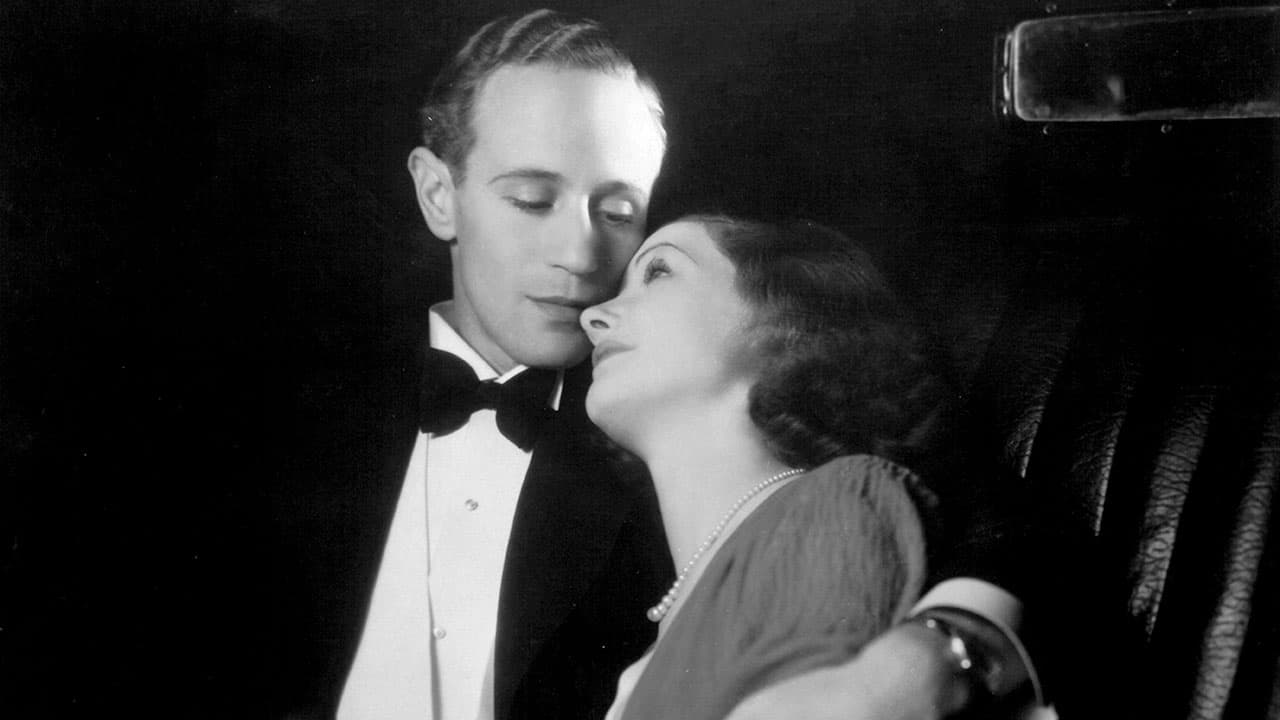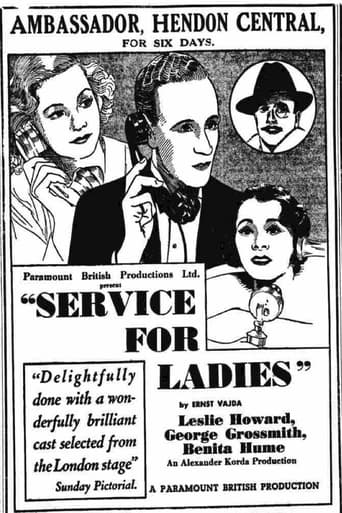

Why so much hype?
... View MoreAlthough it has its amusing moments, in eneral the plot does not convince.
... View MoreOne of those movie experiences that is so good it makes you realize you've been grading everything else on a curve.
... View MoreLet me be very fair here, this is not the best movie in my opinion. But, this movie is fun, it has purpose and is very enjoyable to watch.
... View More"Service for Ladies" still retains a good deal of charm despite its age. Both a romantic comedy and a comedy of errors, its elegant, smooth touch, through the refined performances by Howard, Hume, Allan, Grossmith, and Selten, makes for enjoyable viewing even today.A few points are worth noting for context and appreciation. The running theme of the film is the strictures of class distinction. (Spoiler) The storyline concentrates on Max's (Howard) status as a head waiter in contrast to that of wealthy débutante Sylvia (Allan) and overemphasizes this through the character of "Westlake", the unidentified "King" who books into the fictitious "sporthotel" in Austria "incognito". This subplot is played to comic effect by the portrayal of the King's "incognito" stay as an open secret amongst all of the hotel's staff and guests, wherein provincially-dressed serving girls render him deep bows in unison, while the affluent female guests bow at the neck with the hope of a chance introduction.But the film's portrayal of the status of and regard for royalty (much less social station in general) is quite anachronistic, even for the time. By 1932, the year of the film's release, European royalty as it had been traditionally known was generally a thing of the past, particularly in the most important Continental countries. European monarchism met its death knell at the close of World War I in 1918, by which time the emperors of Austria, Germany, and Russia had abdicated, and others denuded of any real political power. The major powers of Europe were constitutional republics by 1932, with the exception of Italy, which was subject to the fascist regime of Mussolini, a portent of more disastrous politics to come in that decade. The idea that a foreign king would induce such fawning subservience at an alpine hotel in the republic of Austria was absurd in the extreme. Just as astute critics have viewed the 1930's stories of Jeeves and Wooster by Wodehouse as actually a throwback to Edwardian times, so is this movie more properly seen as a nostalgic look back at an earlier time rather than a contemporary view of social conditions.Perhaps the class distinction theme and the royalist subplot is attributable to the background of the writers, who were fellow Hungarian expats along with director Alexander Korda. Their youth was spent under the more benign twilight period of the Austrio-Hungarian Empire, a period of social conditions and mores roundly extinguished by later World War, the Roaring Twenties, the Great Depression, and their resulting upheavals. Indeed, by 1932, the notion that the daughters of the wealthy might be prone to elope with some charmer from the working classes was no longer unusual, due in part to its actual occurrence in instances usually exploited by the tabloids of the time. The nostalgic patina of the film is most likely attributable to the perspective of these Hungarian writers, who likely perceived more modern conditions as less conducive to a light romantic comedy than the Europe of their youth. Thus if the film is viewed as more fairy tale than social commentary, it becomes much more digestible, if not more enjoyable.To segue from the film's anachronism to its clear instances of modernity, I quite enjoyed those time capsule moments that captured the early 1930's and that even portend themes that continue to titillate today. The restaurant fare, the period cars and trains, the candlestick telephones, and the fashions worn by Allan and Hume are all a delight. Max's love of jazz and dancing to jazz are a highlight that aptly displays European fascination with that American-rooted contemporary music. Finally, this English-produced and pre-Production Code film packed a good bit of sexuality, if understated. Countess Ricardi's bathtub scene, Max's reputation as a sexually active ladies' man, and the plunging décolletage are instances of the more European approach to the sexuality of the film. The Production Code would have probably prevented Sylvia lounging on Max's bed at midnight while she tries to seduce him. The sexual themes in the movie are most definitely subtle and inferred, but they are key to its romance and certainly enhance its enjoyment for the contemporary viewer.
... View MoreService For Ladies is an early film by producer Alexander Korda in Great Britain before he started his London Film Company. This one was made under the auspices of Paramount Pictures shot over on the other side of the pond and released in America and in the United Kingdom under their white mountain banner.I'm not sure how well it did here because it deals with the European concept of class distinctions. Not that we don't have it here, but in America it usually involves money. Over there it's titles.Leslie Howard plays the head waiter at a posh London night spot where Morton Selten and daughter Elizabeth Allan are dining out. One look at her and he chases her to the continent when he hears she's going to a resort. And she gets it in her head that Howard is some kind of royalty. After all there is a king from some unnamed country vacationing there who knows Howard who is played by George Grossmith. Of course the king's dined at Howard restaurant before.Service For Ladies is kind of a Cinderella story in reverse where the boy is the one who gets the magical evening. Howard plays the role with his usual charm. I'm sure it did well over in Europe, I can't see it having much of a market in Depression America. Still it's a nice dated antique of a film.
... View MoreHungarian-born director/producer Sir Alexander Korda was responsible for bringing what had once been the provincial English cinema into world prominence through a series of spectacular pre-World War II films -among them "Thief of Bagdad," "Rembrandt,""Four Feathers," "Drums," and "The Private Life of Henry VIII." Their exceptional performances and lavish production values were even the envy of the grand Hollywood studios. In later years as head of his own international company, London Films, Korda only produced, but here in this stylish 1931 film made in the early days of sound and on-the-cheap at the Paramount British studios, he chose to direct as well. Ironically, the film stars that quintessential Englishman, London-born Leslie Howard, whose parents were also Hungarian expatriates settled in the UK. Perhaps because the film was written by the two of Korda's fellow countrymen, script by Lajos Biro from a story by Ernest Vajda, there is a naughty continental touch to this film, more Lubitsch and Molnar than British, with suave Howard pursuing or being pursued by two sexy English beauties, Elizabeth Allen and Benita Hume. (The latter was to marry Ronald Coleman and George Sanders.) Keep an eye out for the future Lady Korda, the gorgeous Anglo-Indian actress Merle Oberon, seen here as only an extra.
... View MoreAlexander Korda was certainly a very fine producer of British films, but SERVICE FOR LADIES is a very dated British comedy of manners playing up the class distinction that prevents commoners from associating with those higher up on the social ladder.Furthermore, the print shown on TCM looked faded and slightly blurry which made the film seem even more of an antique. The script is the sort where mistaken identity is played for whatever laughs it can get--and very few laughs make for a deadly dull comedy.LESLIE HOWARD, who usually has such a flair for romantic comedy, has to carry the film with very little help from ELIZABETH ALLAN and BENITA HUME as two women he fancies. The script doesn't give them enough to work with so the performances are undistinguished, to say the least.Howard was seen to much better advantage in his American films, particularly IT'S LOVE I'M AFTER ('37), a romantic comedy in which his skill at playing comedy was overwhelmingly evident.You won't get that impression here.
... View More